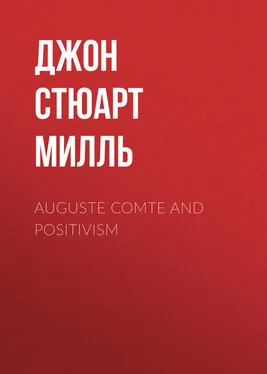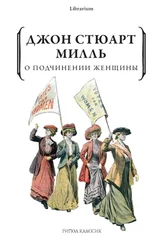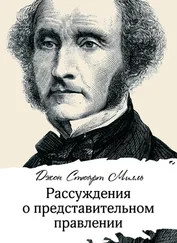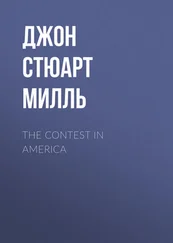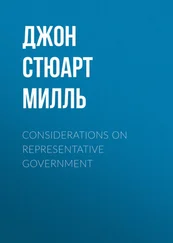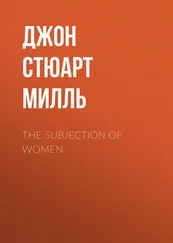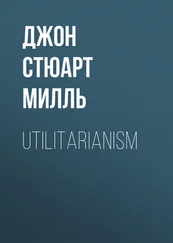Джон Милль - Auguste Comte and Positivism
Здесь есть возможность читать онлайн «Джон Милль - Auguste Comte and Positivism» — ознакомительный отрывок электронной книги совершенно бесплатно, а после прочтения отрывка купить полную версию. В некоторых случаях можно слушать аудио, скачать через торрент в формате fb2 и присутствует краткое содержание. Жанр: Философия, literature_19, foreign_antique, foreign_prose, на английском языке. Описание произведения, (предисловие) а так же отзывы посетителей доступны на портале библиотеки ЛибКат.
- Название:Auguste Comte and Positivism
- Автор:
- Жанр:
- Год:неизвестен
- ISBN:нет данных
- Рейтинг книги:4 / 5. Голосов: 1
-
Избранное:Добавить в избранное
- Отзывы:
-
Ваша оценка:
- 80
- 1
- 2
- 3
- 4
- 5
Auguste Comte and Positivism: краткое содержание, описание и аннотация
Предлагаем к чтению аннотацию, описание, краткое содержание или предисловие (зависит от того, что написал сам автор книги «Auguste Comte and Positivism»). Если вы не нашли необходимую информацию о книге — напишите в комментариях, мы постараемся отыскать её.
Auguste Comte and Positivism — читать онлайн ознакомительный отрывок
Ниже представлен текст книги, разбитый по страницам. Система сохранения места последней прочитанной страницы, позволяет с удобством читать онлайн бесплатно книгу «Auguste Comte and Positivism», без необходимости каждый раз заново искать на чём Вы остановились. Поставьте закладку, и сможете в любой момент перейти на страницу, на которой закончили чтение.
Интервал:
Закладка:
In whatever mode, natural or supernatural, we choose to account for the early Monotheism of the Hebrews, there can be no question that its reception by the Gentiles was only rendered possible by the slow preparation which the human mind had undergone from the philosophers. In the age of the Caesars nearly the whole educated and cultivated class had outgrown the polytheistic creed, and though individually liable to returns of the superstition of their childhood, were predisposed (such of them as did not reject all religion whatever) to the acknowledgment of one Supreme Providence. It is vain to object that Christianity did not find the majority of its early proselytes among the educated class: since, except in Palestine, its teachers and propagators were mainly of that class – many of them, like St Paul, well versed in the mental culture of their time; and they had evidently found no intellectual obstacle to the new doctrine in their own minds. We must not be deceived by the recrudescence, at a much later date, of a metaphysical Paganism in the Alexandrian and other philosophical schools, provoked not by attachment to Polytheism, but by distaste for the political and social ascendancy of the Christian teachers. The fact was, that Monotheism had become congenial to the cultivated mind: and a belief which has gained the cultivated minds of any society, unless put down by force, is certain, sooner or later, to reach the multitude. Indeed the multitude itself had been prepared for it, as already hinted, by the more and more complete subordination of all other deities to the supremacy of Zeus; from which the step to a single Deity, surrounded by a host of angels, and keeping in recalcitrant subjection an army of devils, was by no means difficult.
By what means, then, had the cultivated minds of the Roman Empire been educated for Monotheism? By the growth of a practical feeling of the invariability of natural laws. Monotheism had a natural adaptation to this belief, while Polytheism naturally and necessarily conflicted with it. As men could not easily, and in fact never did, suppose that beings so powerful had their power absolutely restricted, each to its special department, the will of any divinity might always be frustrated by another: and unless all their wills were in complete harmony (which would itself be the most difficult to credit of all cases of invariability, and would require beyond anything else the ascendancy of a Supreme Deity) it was impossible that the course of any of the phaenomena under their government could be invariable. But if, on the contrary, all the phaenomena of the universe were under the exclusive and uncontrollable influence of a single will, it was an admissible supposition that this will might be always consistent with itself, and might choose to conduct each class of its operations in an invariable manner. In proportion, therefore, as the invariable laws of phaenomena revealed themselves to observers, the theory which ascribed them all to one will began to grow plausible; but must still have appeared improbable until it had come to seem likely that invariability was the common rule of all nature. The Greeks and Romans at the Christian era had reached a point of advancement at which this supposition had become probable. The admirable height to which geometry had already been carried, had familiarized the educated mind with the conception of laws absolutely invariable. The logical analysis of the intellectual processes by Aristotle had shown a similar uniformity of law in the realm of mind. In the concrete external world, the most imposing phaenomena, those of the heavenly bodies, which by their power over the imagination had done most to keep up the whole system of ideas connected with supernatural agency, had been ascertained to take place in so regular an order as to admit of being predicted with a precision which to the notions of those days must have appeared perfect. And though an equal degree of regularity had not been discerned in natural phaenomena generally, even the most empirical observation had ascertained so many cases of an uniformity almost complete, that inquiring minds were eagerly on the look-out for further indications pointing in the same direction; and vied with one another in the formation of theories which, though hypothetical and essentially premature, it was hoped would turn out to be correct representations of invariable laws governing large classes of phaenomena. When this hope and expectation became general, they were already a great encroachment on the original domain of the theological principle. Instead of the old conception, of events regulated from day to day by the unforeseen and changeable volitions of a legion of deities, it seemed more and more probable that all the phaenomena of the universe took place according to rules which must have been planned from the beginning; by which conception the function of the gods seemed to be limited to forming the plans, and setting the machinery in motion: their subsequent office appeared to be reduced to a sinecure, or if they continued to reign, it was in the manner of constitutional kings, bound by the laws to which they had previously given their assent. Accordingly, the pretension of philosophers to explain physical phaenomena by physical causes, or to predict their occurrence, was, up to a very late period of Polytheism, regarded as a sacrilegious insult to the gods. Anaxagoras was banished for it, Aristotle had to fly for his life, and the mere unfounded suspicion of it contributed greatly to the condemnation of Socrates. We are too well acquainted with this form of the religious sentiment even now, to have any difficulty in comprehending what must have been its violence then. It was inevitable that philosophers should be anxious to get rid of at least these gods, and so escape from the particular fables which stood immediately in their way; accepting a notion of divine government which harmonized better with the lessons they learnt from the study of nature, and a God concerning whom no mythos, as far as they knew, had yet been invented.
Again, when the idea became prevalent that the constitution of every part of Nature had been planned from the beginning, and continued to take place as it had been planned, this was itself a striking feature of resemblance extending through all Nature, and affording a presumption that the whole was the work, not of many, but of the same hand. It must have appeared vastly more probable that there should be one indefinitely foreseeing Intelligence and immovable Will, than hundreds and thousands of such. The philosophers had not at that time the arguments which might have been grounded on universal laws not yet suspected, such as the law of gravitation and the laws of heat; but there was a multitude, obvious even to them, of analogies and homologies in natural phaenomena, which suggested unity of plan; and a still greater number were raised up by their active fancy, aided by their premature scientific theories, all of which aimed at interpreting some phaenomenon by the analogy of others supposed to be better known; assuming, indeed, a much greater similarity among the various processes of Nature, than ampler experience has since shown to exist. The theological mode of thought thus advanced from Polytheism to Monotheism through the direct influence of the Positive mode of thought, not yet aspiring to complete speculative ascendancy. But, inasmuch as the belief in the invariability of natural laws was still imperfect even in highly cultivated minds, and in the merest infancy in the uncultivated, it gave rise to the belief in one God, but not in an immovable one. For many centuries the God believed in was flexible by entreaty, was incessantly ordering the affairs of mankind by direct volitions, and continually reversing the course of nature by miraculous interpositions; and this is believed still, wherever the invariability of law has established itself in men's convictions as a general, but not as an universal truth.
Читать дальшеИнтервал:
Закладка:
Похожие книги на «Auguste Comte and Positivism»
Представляем Вашему вниманию похожие книги на «Auguste Comte and Positivism» списком для выбора. Мы отобрали схожую по названию и смыслу литературу в надежде предоставить читателям больше вариантов отыскать новые, интересные, ещё непрочитанные произведения.
Обсуждение, отзывы о книге «Auguste Comte and Positivism» и просто собственные мнения читателей. Оставьте ваши комментарии, напишите, что Вы думаете о произведении, его смысле или главных героях. Укажите что конкретно понравилось, а что нет, и почему Вы так считаете.
